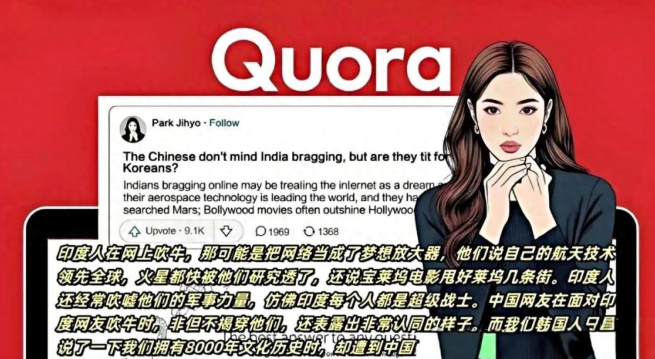On the foreign Q&A site Quora, users from different countries often post curious questions that spark global amusement. Among them, posts from Indian and South Korean netizens often provide the most entertainment.
For instance, one South Korean netizen once asked: “Why don’t Chinese people mind when Indians brag online, yet they always push back against South Koreans?”
This netizen explained his confusion: Indians constantly brag online about things they cannot achieve in reality. They claim their military is the world’s third strongest, boast that their space technology leads the globe, say they’ve mastered Mars exploration, and even insist Bollywood films have surpassed Hollywood.

He added that Indians often exaggerate their military power, calling every soldier a “super-warrior,” boasting daily about their planes and warships, and declaring themselves a global military giant. What puzzled him was that Chinese netizens not only refuse to expose these claims but often humor them, finding Indians “cute” and sometimes even agreeing with their logic.
By contrast, when South Koreans claim their civilization has 8,000 years of history, Chinese netizens react strongly, fiercely challenging and questioning such assertions. “Why is that?” the Korean asked.
How Other Netizens Responded
To outsiders, this confusion seemed unnecessary—like a frog at the bottom of a well mistaking its limited view for the world. Users from other countries stepped in to explain.

One commenter pointed out:
“Indians may brag, but their exaggerations usually focus on their own military, economy, history, society, or public health. They may go over the top, but so what? Bragging isn’t illegal, and it doesn’t cost taxes. They boast, and we laugh—it’s harmless, because no one but themselves takes it seriously.”
Koreans, however, are different:
“Their bragging comes with an air of entitlement—an almost imperial arrogance of ‘it’s ours, it must be us.’ They don’t just exaggerate; they want the world to acknowledge Korean supremacy. Given Korea’s size and actual power, such claims come across as unreasonable and irritating.”

Another netizen put it more bluntly:
“Indian bragging is like harmless fantasy. Korean bragging feels like either they’re trying to ‘steal the house’ or ‘destroy the universe.’ Even aliens would feel the need to clap back at that.”
International Netizens’ Reactions
Even Americans, whose military bases are central to South Korea’s security, find the bragging tiresome. One U.S. user said:
“When Indians brag, the world plays along—it’s funny, and everyone knows it’s not real. But Koreans take it beyond bragging. Claiming 8,000 years of history? If we also played along, next thing you’d say is that Korea created the solar system, the galaxy, and the universe itself. You’d probably demand royalties for us breathing air.”

A Singaporean netizen added valuable insight:
“Indians exaggerate themselves but rarely insult others. Koreans, on the other hand, often belittle other nations, accusing them of copying Korean technology or culture.”
He gave an example:
“When China’s Chang’e-6 lunar mission succeeded, Indians bragged they’d soon launch rockets to ‘snatch’ lunar soil, which was silly but harmless. Koreans, however, claimed China could only succeed because it stole Korean technology. That’s not funny—that’s offensive.”
This observation cut to the heart of the issue. Indians brag about themselves; Koreans often claim others’ achievements as their own.

European Voices
A Belarusian commenter compared the two styles:
“Indian bragging is like a child throwing tough words in a fight. It can be over-the-top, but it’s kind of cute. Korean bragging, however, is fueled by insecurity.”
He continued:
“Koreans don’t even dare print maps showing their true land size. They know they are a small nation but keep calling themselves ‘Great Korea.’ Their history and culture leaned heavily on China for millennia, even their alphabet was adapted from Chinese characters. It’s extreme insecurity—pretending to own what they lack.”
In short, while both Indians and Koreans show puzzling confidence, one is seen as the “village clown”—amusing but harmless—while the other resembles a barking dog, noisy and irritating.
Conclusion
Different national temperaments lead to different expressions of pride. In today’s globalized world, tolerance and humor are important. Most people are happy to exchange ideas with Koreans sincerely. But when bragging crosses into cultural theft—claiming others’ heritage, inventions, or history as Korean—it breeds resentment.
Other nations aren’t foolish. The more loudly Koreans insist everything originated from them, the more insecure they appear, and the more irritation they cause.



